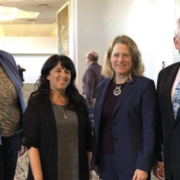‘Big Ideas’ Diversify San Diego Region’s Reliable Water Supply
Ensuring water for future generations requires investing and investigating big ideas, according to Sandy Kerl.
Kerl, acting general manager of the San Diego County Water Authority, shared some of those ideas today in San Diego, as she delivered the opening remarks at the California-Nevada Section of the American Water Works Association annual fall conference, which runs through Thursday at the Town and Country Hotel Convention Center.
“Big ideas” diversify water supply portfolio
The theme of the conference is “Re/Source: Sustaining Life Through Diversity of Water.”
The Water Authority has worked for three decades to increase San Diego County’s water supply reliability through supply diversification in a region with few natural water assets.
“While we’re proud of the progress we have made, we know that we can’t stand still,” said Kerl.
She described three of the “big ideas” the Water Authority is exploring to increase its water portfolio to meet the needs of 3.3 million people and a $231 billion economy:
- A major pumped storage project at the San Vicente Reservoir to enhance clean energy for California
- A new water conveyance system for Colorado River supplies
- And, a storage account in Lake Mead that would allow the Water Authority to help the Colorado River Basin
“We are investing and investigating big ideas for future generations,” says @sdcwa Acting G.M. Sandy Kerl in opening session remarks @CANVAWWA #CANVAFC2019
?Here’s 3:
• Major pumped storage project
• New Colorado River water conveyance system
• Storage account in Lake Mead pic.twitter.com/hkq8sKg7c4— San Diego County Water Authority (@sdcwa) October 22, 2019
Conservation plays key role in sustaining water supply
Kerl also said San Diego County residents play a big part in making water conservation a success.
“I’m proud to say that our 2019 public opinion survey shows that virtually every resident believes in water-use efficiency as a civic duty,” she said.
During a panel discussion, Kerl talked about the importance of supply diversification.
“Creating new sources of supply is critical, but sustainability is really about having a balanced water portfolio approach to ensure a safe, reliable supply,” said Kerl. “Potable reuse is another piece of the puzzle, but you can’t recycle what you don’t have, so we need to look at creating new sources of water supply, such as desalination.”
Tap into resilience
The theme of resilience and sustainability was echoed by the other panelists.
Cynthia Koehler, executive director of WaterNow Alliance, said the organization’s “Tap into Resilience” initiative offers support for projects to enhance water resources now and for future generations.
“The initiative is a unique and comprehensive set of resources for water decision-makers, but also for utility staff and managers to help them implement sustainable water systems,” said Koehler.
Paula Kehoe, director of water resources for the San Francisco Public Utilities Commission, said drought, climate change, and, in particular for the utility, pending environmental regulation, could cause significant issues for water supplies.
“Conservation has been key to increasing our local water supply,” said Kehoe. “We also are pumping groundwater to increase local supply, and we have a groundwater storage and recharge program to build up groundwater supplies for future droughts.”




